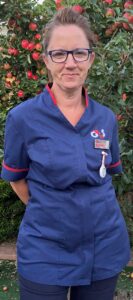In our latest ‘Day in the Life’ Series, we are showcasing the diversity of roles within learning disability nursing. In the first of our blogs in this series, Sarah New, Clinical Lead/Registered Domiciliary Care Manager, at HM Prison & Young Offenders’ Institution Parc in Bridgend, South Wales, tells us about her role.
What is your job title and your main role/responsibilities?
I work as the Clinical Lead/Registered Domiciliary Care Manager at HM Prison & Young Offenders’ Institution Parc in Bridgend, South Wales. I have a dual role which supports both Primary care and the commissioned care packages agreed with our local authority Bridgend County Borough Council. Both my roles involve developing skills and knowledge, governance around clinical activity, complaints, audit and risk management while working alongside staff to encourage the G4S values culture of open, and honest transparency
How did you get into your current role/line of work?
I started my career in 2003 as a support worker for Mencap then went onto working in a long stay hospital. I found the work very rewarding and loved to see these individuals being supported to reach their potential. I applied to work at Parc Prison in 2011 because I was ready for a change, and rehabilitation and enhancing quality of life was a passion of mine. Also, I wanted to educate others on understanding the needs of people with learning disabilities and the positive effect good communication can on their lives.
Can you tell us what a typical day in your role/line of work involves?
I don’t think there is such a thing as “Typical Day”. I can honestly say no two days are the same. I usually start my day by attending the SMT meeting whereby the previous 24hrs are discussed. There are always actions for healthcare however, supporting the wider system to understand what can and cannot be shared is a delicate task. The rest of the shift could be addressing emails, audits, complaints, team meetings. clinical supervision and EDRs or working hand in hand with other colleagues to attend to serious incident following on with debriefs and 1-1 staff support.
What would you say are the ‘best’ or most rewarding parts of your role?
I find the whole of my role rewarding as being able to engage with prisoners and their families to improve quality of life through the delivery of fundamental nursing and personal care. listening to their concerns & worries to identify and manage risks to promote positive outcomes. If I am looking at what’s best about my role, it is being part of a diverse team who are able to make a difference to a minority group that has found their way to being detained within the criminal justice system and isolated from main society.
What advice would you give to others who would like to follow a similar pathway?
I hope that through examples such as my own, the RNLD students recognise that there are opportunities out there where they can make such a difference to people’s lives This role is dynamic, so good time management skills are required. Good communication is required to actively network with both onsite and offsite services to ensure positive outcomes for everyone. I think one of the more important things I would suggest to RNLD students and others considering working in this sector is to source a good supervisor who is able to truthfully support you and help you identify areas of learning and development for yourself.
